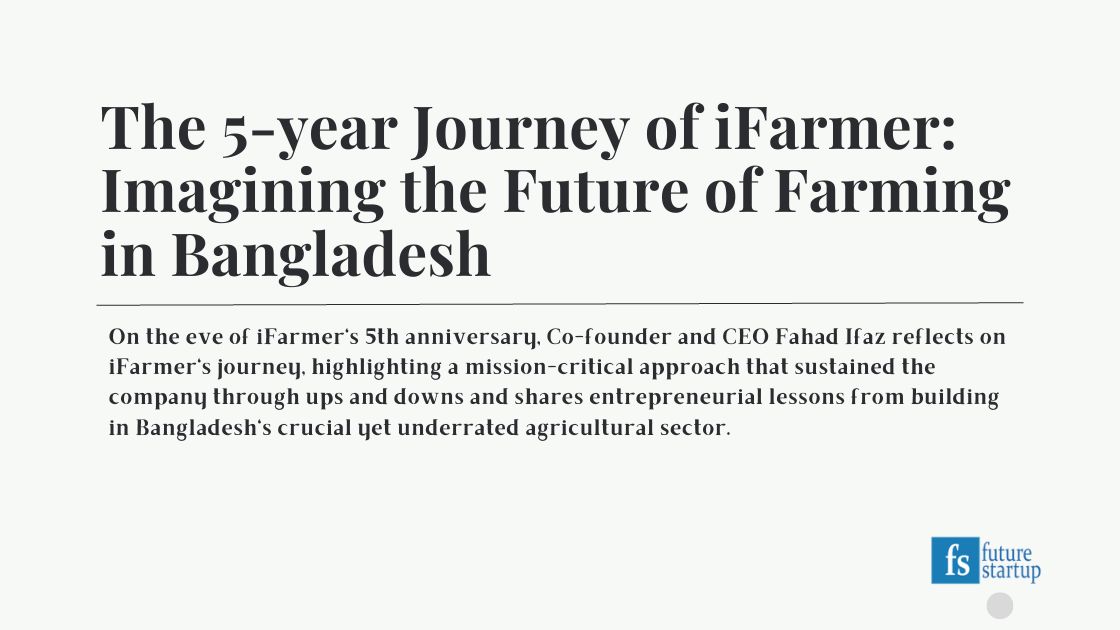
In this fascinating guest post, iFarmer Co-founder and CEO Fahad Ifaz reflects on iFarmer's journey, highlighting a mission-critical approach that sustained the company through ups and downs, and shares his entrepreneurial lessons from building in Bangladesh's crucial yet underrated agricultural sector on the eve of iFarmer's 5th anniversary.
My daughter and iFarmer both turned 5 this year in September.
Children have vivid imaginations. They can imagine the impossible, dream of becoming an artist, a chef, and a policeman all at the same time, and have ideas that defy physics. Then something happens. They grow older and start editing their imagination.
Think of imagination as a giant box from which we take or pick out new ideas. But if you start by editing your imagination, you begin with a tiny box. I think this is why many companies are founded by naive entrepreneurs (including us) — if they had known better, they might never have started their company.
When we started iFarmer, we were naive enough to think that average Bangladeshi people would fund farmers. We imagined (and still do) that farmers would have a more respectable status in the country and, eventually, with the right kind of financing and support services, farmers in Bangladesh would become more profitable, and young people would dream of becoming farmers.
The reason we could survive and thrive in the last 5 years was that we remained true to our mission: to empower smallholder farmers in Bangladesh, and there are about 20 million of them.
The idea of iFarmer was not really accepted well at the beginning. We were told by 'startup gurus' of the country that this wouldn't work; others told us that this sounded like a multi-level marketing business, and of course, everyone said there is absolutely no money to be made in agriculture.
But just like my 5-year-old daughter, we never edited our imagination. We had the humility to see the world as it is and the audacity to imagine the world as it could be.
The reason we could survive and thrive in the last 5 years was that we remained true to our mission: to empower smallholder farmers in Bangladesh, and there are about 20 million of them.
Everything we did and built, sometimes right, sometimes wrong, and at times operating from a gray area due to a lack of policies and regulations, had one single intention: to benefit the farmers.
It is because of this intention and single-mindedness that we had the love and support from peers, regulators, financial institutions, investors, and even the startup gurus who initially said that this wouldn't work.
So today, we are a community of more than 100,000 farmers across 35 districts in the country. We have facilitated close to 600 Crore BDT in financing for the farmers, but more importantly, we have reduced their cost of capital by up to 40%.
We have built an extensive network of 13,000 agri-input retailers in the country who are now able to procure good-quality agricultural inputs through a mobile app, and they are able to pass on those inputs to more than a million farmers.
We also have 300 iFarmer centers and collection points where farmers can walk in, apply for loans, buy inputs, get advisory services, and be able to sell their produce. Very recently, we have launched Agri-machinery experience centers, a first-of-its-kind outlet where farmers can come and experience agri-machinery from multiple brands under one roof.
We are taking on the age-old model of agriculture extension or advisory service by combining training on good agricultural practices, 1-1 consultation with agriculture experts at iFarmer Centers, and getting precision-based advisory using sensors and satellite images. This approach increases farmers' yield and reduces their cost of production by optimizing input usage, such as fertilizer and irrigation.
We started the company with 4 people in a room and currently have close to 300 people and 5 regional offices across the country.
Did I forget to mention that iFarmer today is a BDT 500+ crore turnover company and one of the very few startups in the country that is profitable?
Even after all this, I feel that we are barely scratching the surface. I mean, there are almost 20 million farmers in the country!
None of this was easy. We have had our fair share of failures. But we believe in failing forward. We fail, we learn, and move forward. That has been the case with the agri-insurance model designed to work for smallholder farmers to safeguard them from climate vulnerabilities. At times, we got distracted by revenue and valuation instead of focusing on creating value for the farmers and making them absolutely love us.
Our observation and data say that 90% of the farmers do not want their children to get into farming. The children also don't want to get into farming. And why would they? Breaking their back from dawn till dusk for minimum returns, facing price vulnerabilities, fighting climate change, and whatnot. The big question for us and the entire nation is: If this continues, then who will be our next generation of farmers, and who will feed us?
However, we can change things if we have a goal and work towards it. There are signs of encouragement; 80% of the farmers who work with us have said that they are more confident in continuing to farm.
We started the company with 4 people in a room and currently have close to 300 people and 5 regional offices across the country.
We are not just building a company that makes money. I believe we have started a movement; other entrepreneurs have ventured into this space encouraged by iFarmer. But the movement has to continue, to make farming a respectable and profitable business for the farmers, to motivate the next generation of farmers in the country, and to ensure that farmers are considered entrepreneurs because that is what they are.
iFarmer will continue to lead the way into the future of farming in Bangladesh.
